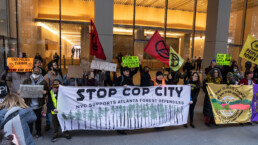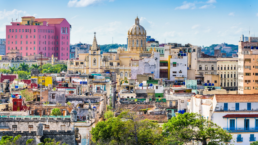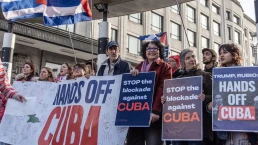Georgia’s sweeping and political application of conspiracy law echoes a tactic that shattered the left roughly a hundred years ago, when the U.S. government targeted socialist parties and militant unions with laws against criminal syndicalism, espionage, and sedition.
By Tadhg Larabee and Eva Rosenfeld, Dissent
Just after sunrise on November 13, 2023, hundreds of protesters gathered in Gresham Park on Atlanta’s outskirts. As they zipped up painted jumpsuits, a police helicopter circled overhead. It was the start of the latest action in a sprawling, decentralized campaign to stop construction of the Atlanta Public Safety Training Center, better known as Cop City.
A two-year occupation of the Weelaunee Forest, the site of the proposed complex, ended in early 2023 after police killed a forest defender known as Tortuguita and, over several months, charged forty-two people with domestic terrorism. The majority of those charged were attending a protest music festival in March while property destruction occurred nearly a mile away. In April, three activists distributing fliers about the police murder of Tortuguita were arrested and jailed for almost three months. It was unclear whether any of the prosecutions would go forward until September, when Georgia’s attorney general, Chris Carr, brought a single case against sixty-one protesters, using the state’s exceptionally broad Racketeer Influenced and Corrupt Organizations (RICO) Act to paint the Stop Cop City movement as a criminal syndicate akin to the Mafia. The sprawling indictment accused them of a conspiracy to spread “virulent anarchist ideals.”

Amid this campaign of state repression, one segment of Stop Cop City put out a national call to action: Meet in Atlanta. March onto the construction site. Issue, through nonviolent direct action, what organizers called a “people’s stop-work order.” Render absurd, through widely publicized mass participation, the notion that this is a conspiracy and not a broad-based political movement.
“It’s vital to make sure everybody knows . . . that there are people in Atlanta that want this to stop,” said Lorraine Fontana, a seventy-six-year-old activist who was arrested days before the march for blocking the entrance to the construction site. “We’re holding saplings,” a young protester said. “To replant the forest that the police have destroyed in trying to build Cop City,” another added. Papier-mâché puppets and protest signs sat in the grass, collecting dew; one sign, shaped like a dragonfly, read, “This is what a domestic terrorist looks like.” Hours later, as the tear gas dissipated and the protesters retreated to Gresham Park, a riot policeman was photographed removing the same sign from nearby Constitution Road. In the hands of the officer, it seemed to turn this charge back on the state.
Recent Posts
Despite Marco Rubio’s Warnings, This is the Time to Go to Cuba in Solidarity Against the Latest U.S. Aggressions
February 10, 2026
Take Action Now When visiting Cuba, one can see quickly the terrible effects of the almost seven decades of the U.S. economic blockade of Cuba.By…
“Hands Off Cuba!”: Left Groups in Europe Mobilize Against U.S. Aggression
February 10, 2026
Take Action Now Hundreds demonstrated in Belgium in solidarity with Cuba as further mobilizations against US imperialism are planned across Europe.……
Democrats Propose Minor Reforms for ICE — and Record Funding
February 10, 2026
Take Action Now Congressional Democratic leaders are asking ICE to agree to reforms, promising to vote for $11 billion in funding for the agency if…
Why We Need to Complain About Democrats
February 9, 2026
Take Action Now Too often, centrist Democrats work against progressives, as with NAFTA and the Crime Bill that accelerated mass incarceration.WORT…




